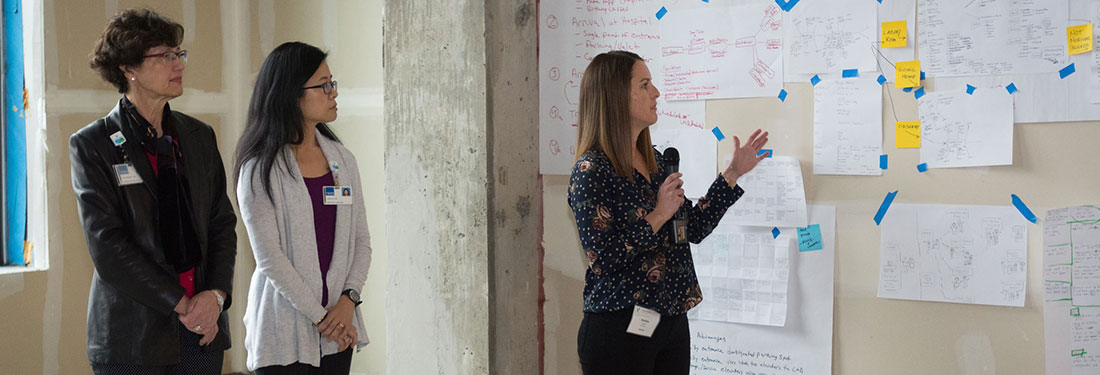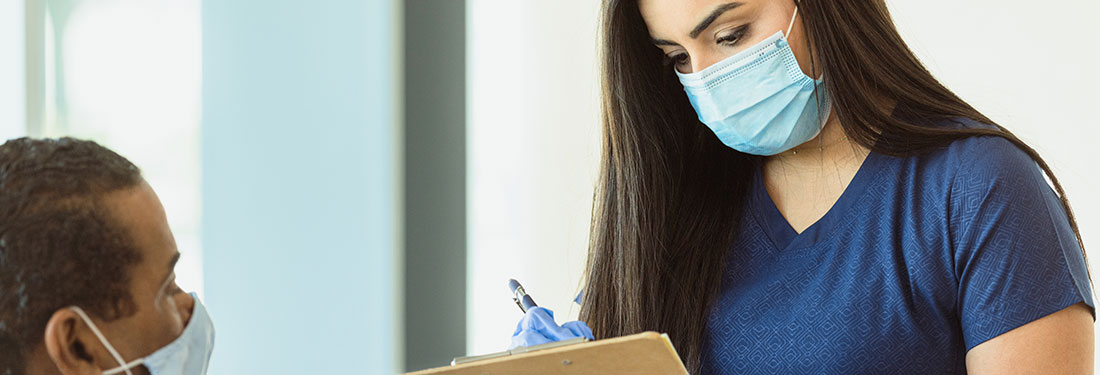Improving Through Crisis: Deploying Improvement Teams When It Matters Most
As we face the ongoing challenges in responding to the COVID-19 crisis, we continue to be inspired by how our clients and partners are meeting this pandemic head-on—providing fearless care to patients during a very difficult time. We’d like to thank you for everything you are continuing to do in order to put patients first and provide care while keeping your team members safe.
The ongoing COVID-19 crisis has challenged organizations including Virginia Mason to move quickly to identify and solve problems, innovate, design new work flows and adjust staffing as the workload has changed. More changes surely lie ahead as we all transition to our new normal, without increasing additional financial stress for our organization.
Leveraging a foundation of improvement culture
We have learned the importance of having a management infrastructure and activities that can be leveraged not just during a crisis, but before and after the crisis. This provides a solid foundation to help us face our challenges effectively and capture learnings to help us to better respond to and manage the next crisis that may come our way. Effective management systems assure that foundational skills are developed and processes are in place to build on learnings throughout the crisis.
A critical piece of this puzzle can be effective and well-utilized improvement resources or teams such as an improvement office or as we call it, a Kaizen Promotion Office (KPO). Teams like a KPO share a goal of accelerating adoption of the management method including training and coaching leaders so that they lean into the management method rather than chase other, less effective solutions. Some of the work our KPO has led during this crisis includes:
- Visual management – Developing visual controls and production boards in the Command Center to help manage capturing and communicating real-time information.
- Acceleration of innovation – Working collaboratively with teams for rapid process development, training and implementation including the process for screening at all hospital entries.
- Process analysis – Using methods like flow mapping to conduct current state analysis in order to improve processes.
- Capturing learnings – Managing documentation of process improvement, the sharing of ideas and keeping track of lessons learned that will prove useful beyond the crisis and into the new normal.
How a strategic partner is harnessing a culture of improvement and KPO
Many of our strategic partners have also deployed their process or performance improvement teams, KPOs and the methods and tools of their management systems in innovative ways as a response to the crisis. A California FQHC, just starting their second year of adopting a culture of continuous improvement, is using their management system and Kaizen Promotion Office to respond to COVID-19 and accelerate much needed clinic flow measures in order to meet community demand.
Their KPO leader realized the window of opportunity to respond to the crisis by deploying the KPO team to the largest clinics in their system to review the current state of clinic operations and embed and refine all of the standard work developed over the first year’s improvement activity. KPO team members went out immediately to engage the clinic home teams in documenting the current state value streams for the most frequent and needed clinic visit types. Current patient flow value streams were documented cycle-by-cycle through direct observation of KPO and clinic leaders who had recently completed their Lean for Leaders coursework.
These value streams were presented to all staff who were then asked to document all wastes, frustrations, and “rocks in the shoes” that were preventing the desired flow. Then, after the current state was fully documented and presented, the team set about teaching and implementing the standard work meant to reduce burden, eliminate waste and improve flow.
They developed a 6-step, “Go See, Ask Why, Show Respect” process:
- See the “as-is” process and build value streams for key appointment times.
- Train all staff to the standard work real time, in flow during the clinic day utilizing KPO as side-by-side coaches for successful implementation.
- Conduct in-process measurements to demonstrate improvement and show progress to targets.
- Refine and improved standard work with staff feedback.
- Begin coaching front line managers and supervisors on establishing their daily management routines and tools.
- Broadcast a Friday “report-out” on that week’s activities, progress and plans for the following week.
Over four weeks, the KPO made sure that each clinic would be able to carry forward all improvement activity and daily management on their own for sustainable results. At the end of each clinic deployment, KPO then selected their next clinic site and began preparations with clinical and administrative leadership at the next site. The first clinic that has completed this activity has seen visit volumes grow 30-40% over pre-COVID-19 levels.
When asked why they feel this work has been so welcomed and effective, KPO team members shared that the intentional time in the first week spent documenting what was really happening at the clinic and engaging team members on identifying wastes and burdens of work helped the clinic sites feel respected and led them to welcome the KPO in to work collaboratively.
How are you capturing learnings?
This crisis presents us with immense challenges to overcome, but the recovery also presents us with a unique opportunity to capture learnings and implement new innovations so that we are stronger as a result and can see permanent improvements to the way we provide care. The question we want to pose is not just how are you changing the way you provide care, but how are your systems helping to frame your problems and support the way you approach changing work? For us and many of our partners, a significant part of the answer revolves around the continued development of a culture of continuous improvement backed by the power of a shared management method, effective improvement resources like a Kaizen Promotion Office and a visible, committed and engaged leadership team.
Learn More: Leadership Through Crisis Interview Series – Gary Kaplan and Chris Backous
In the first in our “Leadership Through Crisis” Interview Series, Chris Backous, MHA, Executive Partner of Transformation Services, interviews Gary Kaplan, MD, SVP, CommonSpirit Health, on Virginia Mason’s response to the COVID-19 crisis and the innovations that resulted. The recording, Q&A transcript and audio-only versions are available for viewing or listening.
Watch now







